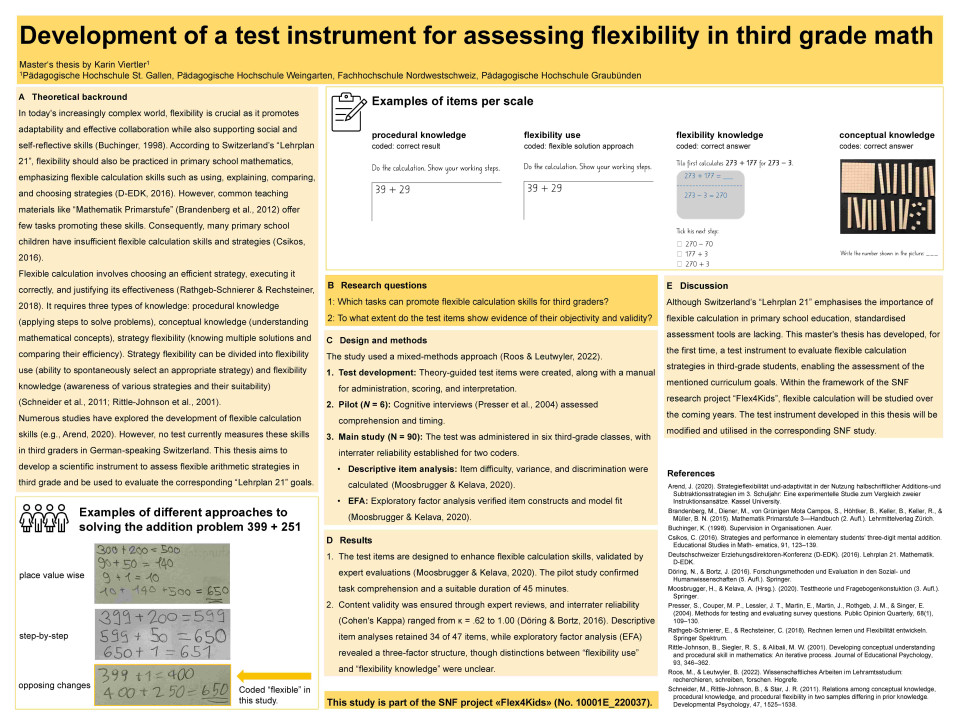Theoretical background
Strong mathematical skills are essential for success in vocational training and university studies. In Switzerland, the “Lehrplan 21” curriculum emphasizes the importance of developing flexible calculation skills in arithmetic in primary school. These skills include the ability to use, explain, compare, and choose appropriate calculation strategies (D-EDK, 2016). Current textbooks such as the “Schweizer Zahlenbuch” (Kocher et al., 2021) contain only few explicit tasks promoting flexible calculation skills. Consequently, many primary school children have insufficient flexible calculation skills and strategies (Csikos, 2016).
Three types of mathematical knowledge are relevant to calculate in a flexible way: Procedural knowledge, conceptual knowledge, and strategy flexibility (Schneider et al., 2011). In equation solving, procedural knowledge means recognizing structures and applying solution steps and strategies, while conceptual knowledge involves understanding mathematical concepts and their relationships (Rüede et al., 2023). Strategy flexibility refers to knowledge of multiple solution strategies and how to compare them with respect to their suitability and efficiency (Verschaffel et al., 2009).
Current primary school didactics show various approaches to promote flexible calculation skills in arithmetic (Arend, 2020). A common approach is comparing multiple strategies showing different solutions per task. This involves simultaneous presentation of strategies for direct comparison of the solution steps which fosters discussions about for the similarities, differences, and efficiency of each strategy (Rittle-Johnson et al., 2021; Star & Rittle-Johnson, 2008).
Numerous studies have investigated the development of flexible calculation skills. For example, a study from Arend (2020) with 79 third graders examines whether an explicit or problem-solving approach better promotes flexible and adaptive strategy choice, with tests primarily assessing calculation skills in the German school context. No test instrument currently measures flexible calculation skills in arithmetic for third graders in German-speaking Switzerland. This Master's thesis aims to fill this gap by developing and testing a scientific test instrument for third-grade flexible arithmetic strategies.
Research questions
Which tasks can promote flexible calculation skills for third grade students in German-speaking Switzerland?
Methods
The study used a mixed-methods approach (Roos & Leutwyler, 2022). Theory-guided test items were developed and utilized to construct a performance test instrument, assessing strategy flexibility, procedural knowledge, and conceptual knowledge (Star & Rittle-Johnson, 2008).
Initially, the items were piloted with individual students (n = 6) for comprehension and duration (Moosbrugger & Kelava, 2020). Insights from this pilot phase refined the instrument before it was tested with several classes.
Sample
The newly developed test instrument was empirically tested in six third-grade classes (n = 90) in St. Gallen and Zurich. Each test session lasted approximately 45 minutes. Personal contacts and snowball sampling was used for the recruitment.
Test instrument description
The developed math test instrument focused on the mathematical operations “addition” and “subtraction”. Ensuring scientific rigor, the test adhered to objectivity, utility, and feasibility criteria, with a test manual explaining administration, scoring, and interpretation. Content validity was ensured by expert evaluation of item representativeness (Moosbrugger & Kelava, 2020).
Data analysis
Descriptive item analysis (Moosbrugger & Kelava, 2020) was used to calculate item difficulty, variance, and discrimination, assessing if items differentiated well between students. Results guided the first test adjustments. Furthermore, an exploratory factor analysis (EFA) checked the construct validity, verifying if the items measured the intended constructs and if the theoretical model fit the data (Moosbrugger & Kelava, 2020). Results will be presented at the conference.
Key words: test instrument development; mathematic tasks; flexible calculation skills; primary school students; factor analysis

